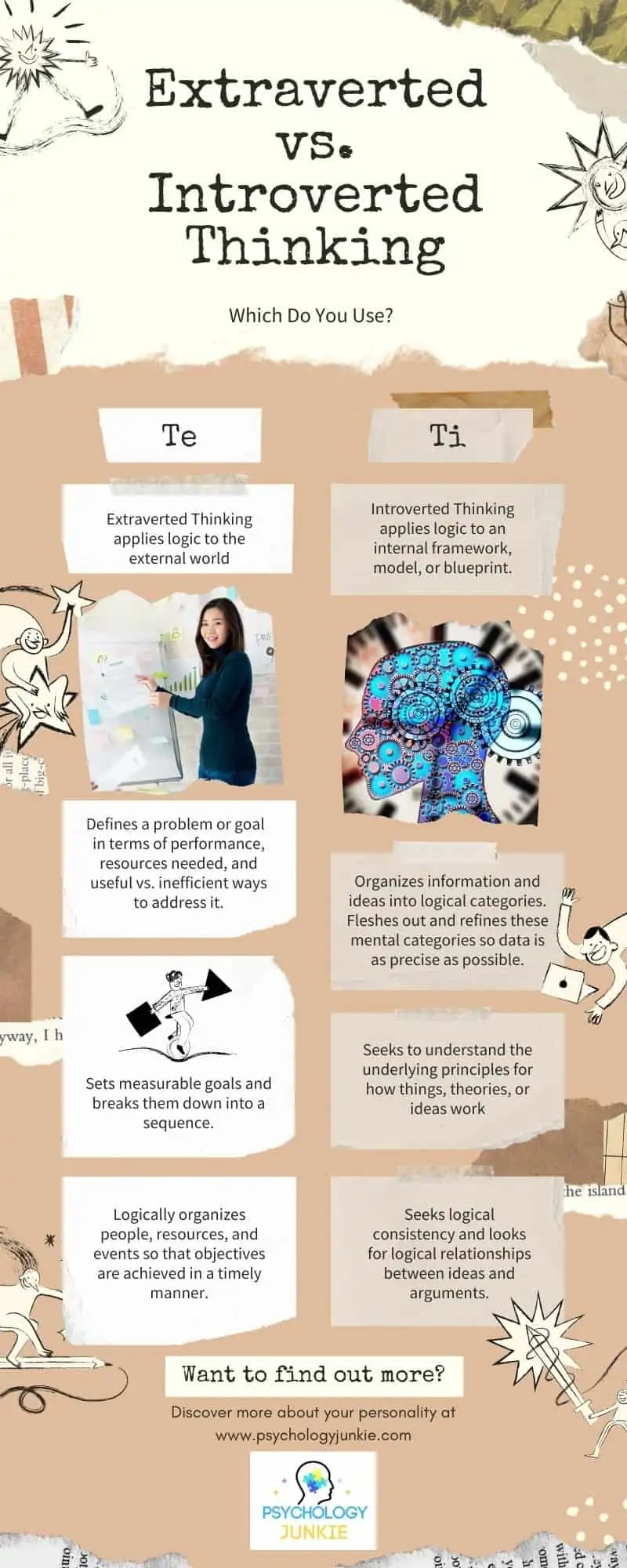What Is Extraverted Thinking?
Extraverted Thinking: a cognitive function that focuses on organizing the world to achieve an objective. But it’s more than just that. Today we’re going to get into all the details of this fascinating cognitive function.
Have you ever come across the word “Te” on a type website (like this one) and gotten confused or irritated? Perhaps you’ve groaned and thought to yourself, “What does Te even mean?” Many type experts make use of jargon or shortcuts to describe the more intricate aspects of type. But today we’ll explain Extraverted Thinking (Te) in simple terms that anyone can comprehend.

Table of contents
- What Is Extraverted Thinking (Te)?
- Which Personality Types Use Extraverted Thinking (Te)?
- Extraverted Thinking At Its Best and Worst:
- Extraverted Thinking vs. Introverted Thinking (Te vs. Ti)
- More Examples of Extraverted Thinking:
- A Look at the Extraverted Thinking Types:
- Extraverted Thinking Doesn’t Work Alone
- Summing Up What Extraverted Thinking Does:
- What Are Your Thoughts?
Estimated reading time: 9 minutes
What Is Extraverted Thinking (Te)?
Extraverted Thinking (Te) is one of the mental functions you use when you have a decision to make. Say you have to decide what you want to major in in college:
One person might think about where their heart is leading them and what inspires them.
Another person might think about what would please the people they love or help people they care about.
Someone else might think about what looks personally interesting.
Still another person might look at what seems practical, cost-effective, and most likely to bring in a good income in the future.
Most of us think of a combination of these things. However, when we focus on the last thing (what’s logical, practical, and most likely to bring a return on investment) we’re using the Extraverted Thinking part of our mind.
Extraverted Thinking, or “Te” for short, focuses on logic, efficiency, and objective criteria. When you’re using Te, you sort through facts, figures, pros, and cons in order to make a decision or come to a conclusion. For example, when going shopping for a car, an extraverted thinking type would gather and evaluate all of the data and statistics that pertain to each car (gas mileage, efficiency, safety ratings, etc.) before making a decision. They’d also look at their budget and external requirements to ensure they’re making a logical choice.
Extraverted Thinking wants the environment around it to “make sense.” Types that use this process seem to quickly grasp where things go and how to arrange people to get a job done in the most effective way. Having a chaotic, disorderly environment is anathema to them.
In short, Extraverted Thinking is what helps us organize and structure our external world in a sensible, logical, efficient way.
Who Uses Extraverted Thinking (Te)?
Each of the 16 personality types uses Te to some extent. However, the four types that rely on it the most are: ESTJs, ENTJs, ISTJs and INTJs
Extraverted Thinking At Its Best and Worst:
When Extraverted Thinking is healthy and well-balanced, it can help us prioritize our tasks to create an effective action plan for the day. TJ types can easily segment a list of things to do based on order of importance and the overall daily flow (where you’ll be, when you’ll be there, etc). Te helps us not to waste unnecessary steps when we’re completing something.
When Extraverted Thinking is poorly developed, it can look cold and unfeeling because it de-prioritizes people’s feelings to focus on impersonal logic. It may also become domineering and stubbornly insist on its own way to the exclusion of others, assuming that since it’s logical it is therefore the only right way. Or it may become too hasty, making decisions in a rush and boiling everything down into a black or white judgment when there is more grey area to consider.
Extraverted Thinking is at its finest when it helps us achieve our objectives and get things done efficiently. It can help us to refine our strategies, overcome barriers, or believing in our capacity to achieve our goals.
Extraverted Thinking (Te) vs. Introverted Thinking (Ti)
Because Te is focused on the world outside one’s self, it is interested in organizing and delegating. External order is paramount. As a result, TJ types like having a neat office, a clean desk, and a well-managed to-do list. They get a sense of deep satisfaction from productivity, order, and efficiency. They also don’t tend to mind telling other people how to do things. At a healthy level, this can seem helpful without being overbearing. When unhealthy, it can seem bossy or controlling.
Introverted Thinking
In contrast, Introverted Thinking is interested in organizing the internal world as precisely as possible. If TJ types help us achieve our goals efficiently, Introverted Thinking (TP) types help us to understand how things work thoroughly. Introverted thinking is focused on mental organization, regardless of how it affects the neatness of a desk or the task-list an employer has set before them. TP types care about making logical decisions for themselves and have little interest in organizing others (unless they’re blatantly getting in the way of their personal goals).
An Example of the Difference Between Te and Ti:
As a rather simplistic example, a TJ type might see a cockroach and say, “I’ll get the shoe.” A Ti type might say (or think), “Well I can see two possible options. One is to step on it quickly before it moves. The other is to move the bookcase so I can reach behind it and grab a rolled up newspaper to knock it out of its lair… Then I could slide open the window and shoo it out. I wonder what kind of cockroach it is, and how it got here.”
You see? Te focuses on taking action to get things done, whereas Ti wants to understand how and why things work the way they do.
If a TJ type has an iPhone they’ll want to first understand how to use it quickly. “How do I change the ringer settings? How do I take video?” You get the idea.
If a TP type has an iPhone they’ll want to first understand how it works and how all the features correspond together in a detailed way. For the TP, understanding how the system works comes before using the system to get something done.
That said, Sensing-Perceiver types tend to take action quickly if the moment demands a rapid response. Left to their own devices with no urgency, however, they enjoy tinkering with things to understand how they work.
More Examples of Extraverted Thinking:
Example 1 – Making decisions
When extraverted thinkers make decisions, they take into account what is practical, useful or functional. They are primarily concerned with their effectiveness in the world and tying up loose ends so that they may move on to more productive tasks.
Example 2 – Dealing with people
When extraverted thinking types focus on people, they’re likely to do so by trying to solve their problems instead of dealing directly with feelings. They would much rather help you sort through your options or figure out what needs to happen step-by-step than have an emotional conversation. Even when extraverted thinkers are good at communicating their feelings, they can come across as being rather blunt or brusque.
Example 3 – Getting things done.
Unlike some stereotypes would imply, TJ types aren’t all about work and no play. They enjoy the thrill of adventure and excitement as much as the next person (sometimes more!) However, they naturally focus on completing tasks because they know that there will be plenty of opportunity to play once everything is done. They don’t like wasting time or dilly-dallying, and if you’re a slacker you’re bound to get on their bad side.
Example 4 – Narrowing down options.
Extraverted Thinking doesn’t like middle-ground or gray areas. TJ types like boiling everything down into a yes or no answer (sometimes to their benefit or detriment). When people are feeling indecisive or directionless, a TJ type can help them narrow down their options and be more decisive. They’re good at looking past all the mental clutter and “what if’s” to see what needs to be done and how time and deadlines are at play.
A Look at the Extraverted Thinking Types:
ESTJ – Extraverted Thinking with Introverted Sensing
ESTJs are frank, decisive, and direct. They’re good at taking charge of situations and can help create order out of chaos. At their most balanced, they are self-confident yet modest about their capabilities. They have an active lifestyle, and enjoy staying busy with work, errands, and the people in their communities and families. Healthy ESTJs are grounded, down-to-earth, and pragmatic. At their worst, they can be controlling, harsh, domineering, or narrow-minded.
ENTJs – Extraverted Thinking with Introverted Intuition
ENTJs are forward, decisive, and up front. They excel at bringing people together toward long-term goals and predicting how events will turn out in the future. At their best, ENTJs trust their inner voice to complement their analytical side. They notice trends and patterns, then take advantage of them to achieve far-reaching goals. At their worst, they may be overly pushy or single-minded in attempting to get ahead or they may use whatever methods possible to “win.”
ISTJ – Introverted Sensing with Extraverted Thinking
ISTJs are practical, efficient, and adhere to a stringent code of ethics. They like sorting through data and facts to comprehend all the ins-and-outs of a problem. At their best, ISTJs are self-disciplined individuals who set high standards for themselves as well as others. They enjoy assisting people they care about and making sure they’re looked after. At their worst, they are stubborn, inflexible, or overly strict. Unhealthy ISTJs are narrow minded and detail oriented to the point of losing sight of the overall picture.
INTJ – Introverted Intuition with Extraverted Thinking
INTJs are curious free-thinkers who explore concepts and ideas using objective standards and logical principles as a foundation. When INTJs are balanced, they can be flexible problem solvers who abandon preconceived ideas in order to come up with creative answers that haven’t been considered before. However, they can also be condescending and sarcastic at their worst, putting themselves above others. They may get so focused on creating a perfect product that matches their vision exactly that they lose touch with what’s most efficient or logical.
Extraverted Thinking Doesn’t Work Alone
Types with Extraverted Thinking also prioritize another mental process called Introverted Feeling (Fi). Introverted Feeling causes extraverted thinking types to want to understand their own feelings, values, and ethics. Therefore, TJ types will have a strong desire to make decisions that are in line with their morals. They may have a hard time justifying decisions that ignore their inner values or they may put their values behind a project they’re completing. For example, they may organize a way to get clean water to communities in developing countries because it’s important to their introverted feeling side. However, they might not do it in the “nicest” way and they may not know how to deal with the emotions of the people working alongside them.
Summing Up What Extraverted Thinking Does:
- Develops applicable standards to guide decision-making.
- Organizes the external world in a logical, efficient way
- Applies objective logic within a framework of rules, standards, and externally agreed-upon guidelines
- Is energized by reaching goals and accomplishing tasks
- Puts everything in its proper place
- Asks “How can I use this to make my life easier or accomplish my tasks more quickly?”
- Strives for equal standards and expectations across the board
- Spots illogical statements or systems
- Thinks through logic and decisions out loud
What Are Your Thoughts?
Did you enjoy this article? Do you have any more insights or life experiences to share? Let us know in the comments!
Find out more about your personality type in our eBooks, Discovering You: Unlocking the Power of Personality Type, The INFJ – Understanding the Mystic, The INTJ – Understanding the Strategist, and The INFP – Understanding the Dreamer. You can also connect with me via Facebook, Instagram, or Twitter!
Subscribe to Our Newsletter

Want to discover more about personality type? Get the inside scoop with Susan Storm on all things typological, along with special subscriber freebies, and discounts on new eBooks and courses! Join our newsletter today!













So accurate. My family has 3 people with Extroverted Thinking as one of their first four functions, and let me tell you, my sister’s Te in the inferior position looks way different from my auxiliary Te.
YaY!! You have given a terrific description of TE, Susan! INTJ lady here. I can’t help but sort through the mental “litter” to find the correct (i.e. logical) outcome. Thanks for the informative article.